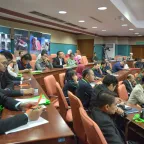The Geneva Conventions 150 years later … still relevant?
… as the humanitarian consequences of certain weapons. For example, on the impact of drone … The humanitarian consequences of nuclear weapons, the call for nuclear disarmament and the relevance of these …



